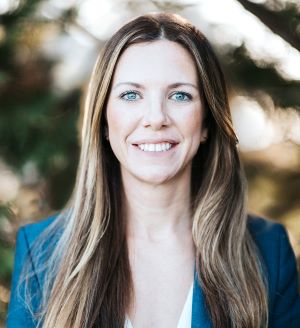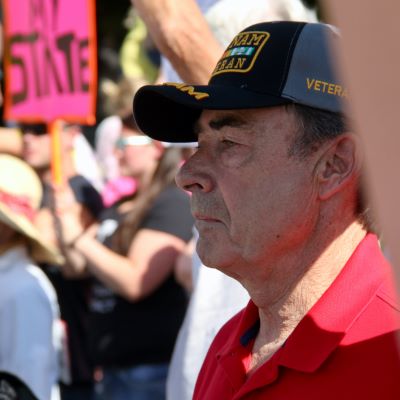Enter your email to receive the CareQuest newsletter:
March 20, 2023
By Chelsea Chokas, MSM, Program Specialist, CareQuest Institute
A 70-year-old veteran living in Arizona making less than $30,000 a year who was forced to receive dental care in Mexico but was unable to update his dentures due to COVID-19 travel restrictions. A 61-year-old, college-educated veteran living in Rhode Island who has diabetes and PTSD and can’t speak or eat with his dentures can’t afford the tens of thousands of dollars needed for dental implants and struggles to stay employed because of his oral health. A fully disabled 53-year-old veteran living in Arkansas with depression, PTSD, heart disease, and diabetes who couldn’t see a dentist because the dental referrals from the US Department of Veterans Affairs (VA) were backlogged a year.

Program Specialist, CareQuest Institute
These stories are real and happen too often to those who dedicated their time and service to defending our country.
And these veterans are not alone. This is the stark reality for millions of veterans across our country who struggle to access dental care. These men and women have higher rates of oral health problems like gum disease, tooth pain, and tooth abscesses — many of which develop due to a lack of dental coverage.
To help bring attention to these troubling trends and to educate policymakers on the benefits of expanding access to dental care for veterans, the American Institute of Dental Public Health (AIDPH) is partnering with CareQuest Institute and with veteran service organizations for Veteran Oral Health Hill Day on March 27 and 28 to educate policymakers on the benefits of strengthening dental benefits for veterans. (To help support the event, AIDPH will host a tweet chat on March 28 at 1 p.m. ET using #Dental4Vets.)
Troubling Statistics about Veteran Oral Health
The need to strengthen those benefits is clear when you look at the numbers: According to the VA , out of the 9.2 million veterans enrolled in VA health care, about 1.4 million are eligible for comprehensive dental care — that’s just 15%. This is because veterans’ dental care is only covered during time of service or for 180 days post-separation from the military. After that, most veterans are on their own. Even those who are eligible for coverage often have difficulty navigating the complex system, with only 33% accessing their benefits. This unfortunate reality exists because our government requires veterans to meet strict eligibility requirements. Essentially, veterans do not qualify for dental care from the VA unless they have a pre-existing dental condition, are 100% disabled, or were a prisoner of war. This is becoming increasingly problematic as more research is demonstrating that poor oral health has a direct tie to poor overall health, particularly among veterans.
This critical gap in health care coverage is having a grave impact on the health of our country’s veterans. A 2022 white paper issued by CareQuest Institute and the AIDPH revealed veterans are more likely than non-veterans to experience oral diseases that affect their quality of life. Approximately 42% of veterans report having had gum treatment or bone loss around their teeth, compared to 27% of non-veterans. Roughly two in five, or 8 million veterans, describe their oral health as “fair” or “poor.”
Additionally, nearly 24% of veterans live in rural areas, where consistent access to care can be challenging. A new report from AIDPH and CareQuest Institute shows that compared to urban veterans, rural veterans are more likely to rate their dental health as “poor,” more likely to have or need dentures, and pay higher out-of-pocket costs for dental care.
We need a comprehensive solution to this unmet problem faced by millions of people who so bravely risked their lives to fight for our country.
A Step Forward in Mental Health, An Urgent Need in Oral Health
Even though oral health care does not seem to be top of mind, the VA recently took a big step to address the needs of veterans’ mental health. Starting January 17, veterans in suicidal crisis can go to any VA or non-VA facility for free emergency health care. This strengthening of mental health care for veterans is commendable. Now the VA needs to also see the value of oral health care for veterans — and organizations are taking steps to make that happen.
Partnerships like the one between CareQuest Institute and AIDPH have led to the development of data-driven recommendations informed by the veteran community to increase accessibility to oral health care and stimulate rural oral health innovation.

Among those recommendations is the expansion of eligibility requirements for VA dental services. Congress and the federal government should act so that more veterans are covered.
Veterans also need access to comprehensive care teams that collaborate seamlessly to provide optimal care by addressing medical, dental, and behavioral health needs. That includes deploying diverse, multidisciplinary care teams to facilitate whole-person care.
And because nearly a quarter of our nation’s veterans live in rural areas that further create barriers to dental care, the role of Federally Qualified Health Centers (FQHCs) and rural health clinics must be expanded to better reach these areas.
All of these solutions are within reach, and there is hope on the legislative front, too. Senator Bernie Sanders (I-Vt.) has long advocated for veterans' rights and, specifically, their right to oral health care. During the 117th Congress, he introduced the Veterans Dental Care Eligibility Expansion and Enhancement Act, which would have expanded eligibility for comprehensive dental care to all veterans receiving VA health care. The bill urged the VA to establish and maintain a dental clinic in every state and creates a student debt repayment program for incoming dental professionals who serve VA dental clinics. Unfortunately, legislators did not pass the bill. But stakeholders are hoping that legislators introduce similar bills in the current term.
After putting their lives on the line to serve our country, access to critical health care services is the last thing that veterans should have to worry about. And while the data show that the barriers to this care are having dire consequences for veterans, we have the ability to make positive advancements to help them. Now, we just need the will to ensure that veterans have access to the health care they need and deserve.